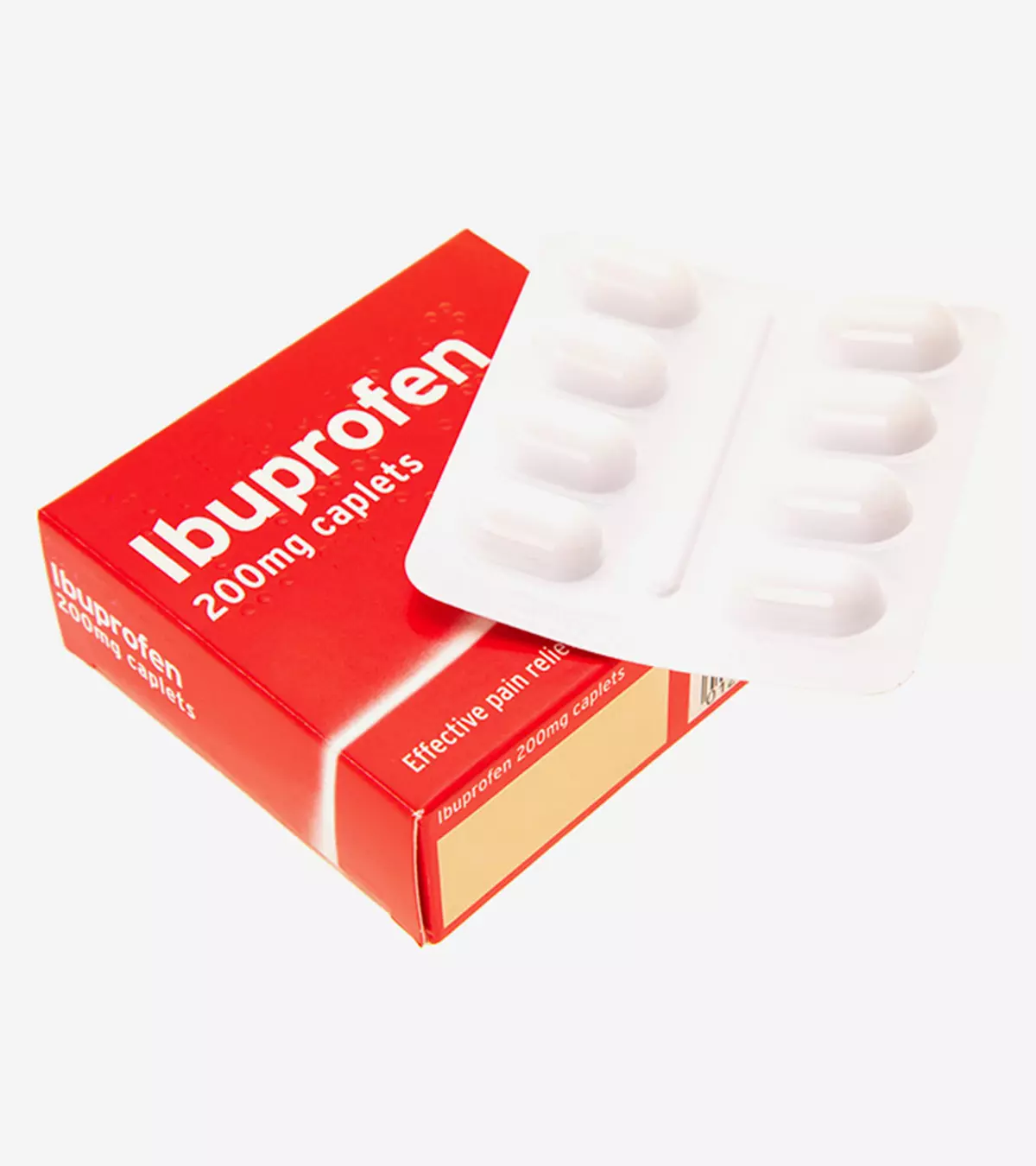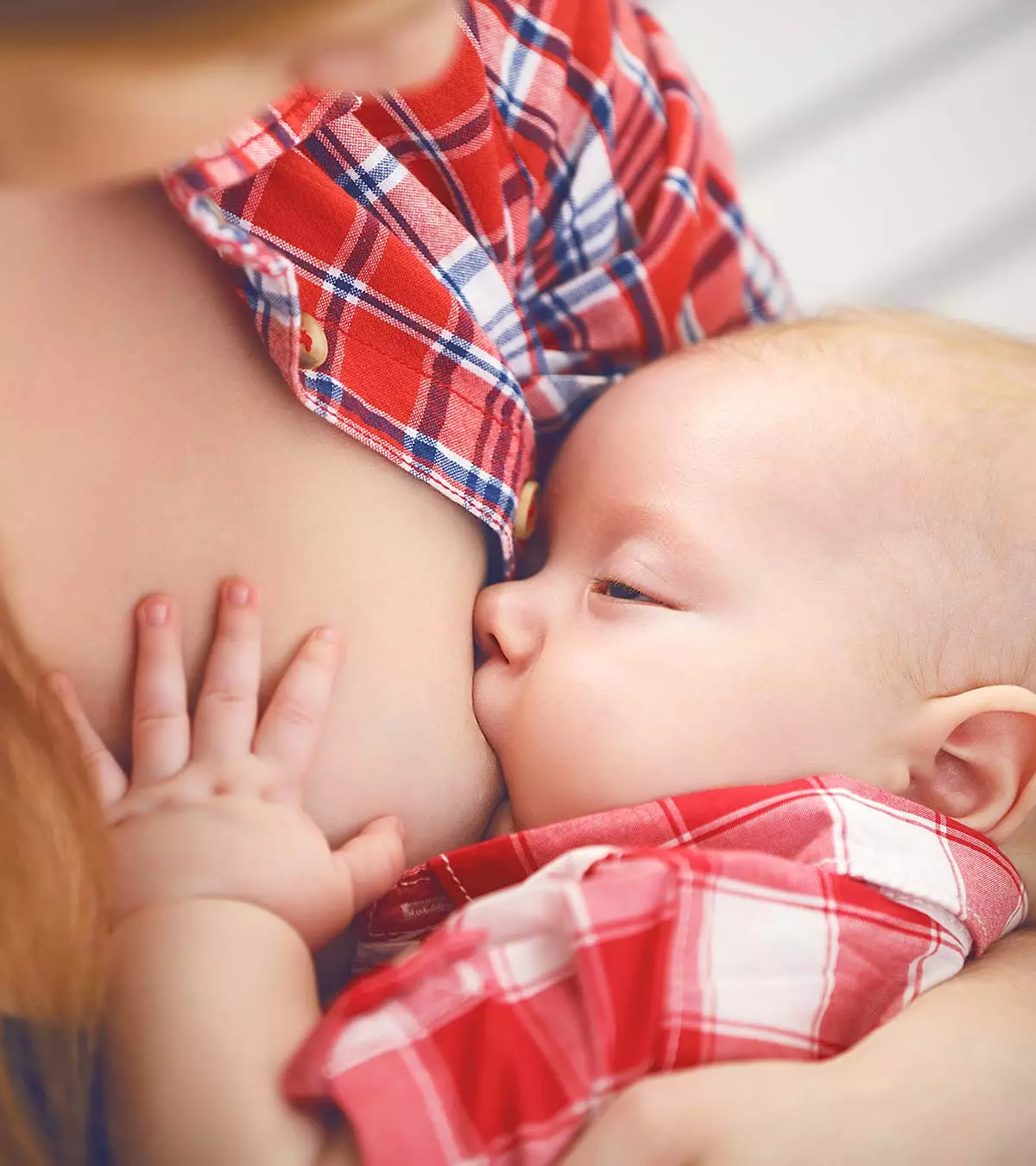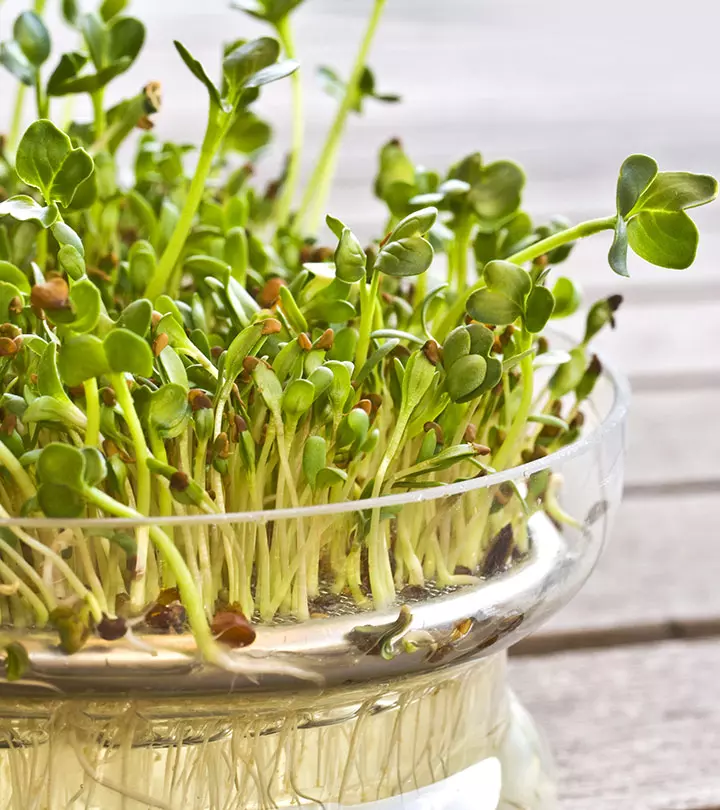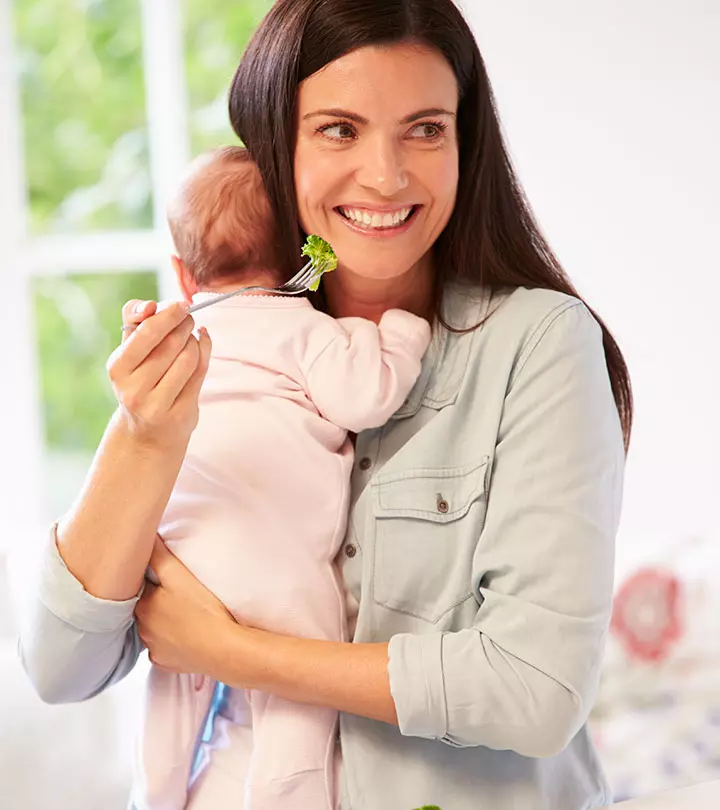
Image: ShutterStock
Peanuts are a great source of protein and many other important nutrients. However, most women are apprehensive about the safety of consuming peanuts when breastfeeding. If the mother has nut allergies, children may also develop the same in most cases. Also, while breastfeeding, a small part of the protein present in the peanuts may leak into the milk and cause allergies in the baby. Therefore, you must be cautious about including them in the maternal diet while breastfeeding your baby. Read the post to know more about having peanuts when nursing, their health benefits, and the associated risks.
Key Pointers
- Peanuts provide lactating mothers with extra calories as they are rich in healthy fats, omega-3, proteins, and nutrients.
- The health benefits of peanuts include improved digestion, heart health, balanced blood sugar levels, and enhanced immunity.
- Avoid peanuts if there is a history of nut allergies.
- If consuming peanuts, it’s essential to observe the breastfed baby for any signs of an allergic reaction.
Health Benefits of Peanuts During Breastfeeding
Peanuts can be a healthy source of protein for new mothers during and after pregnancy, particularly while breastfeeding. Unlike other protein sources, they can be consumed raw. Have them in moderation to support your overall well-being and boost your energy during this phase.
Peanuts can also turn out to be great calorie-dense snacks for new moms and can help get the extra calories and nutrition that is needed during breastfeeding. Is it ok to eat peanut butter while breastfeeding? Well, peanut butter could also provide the mother a good dose of healthy fats, energy, omega 3 fatty acid and proteins during this crucial stage (1).
 Quick tip
Quick tip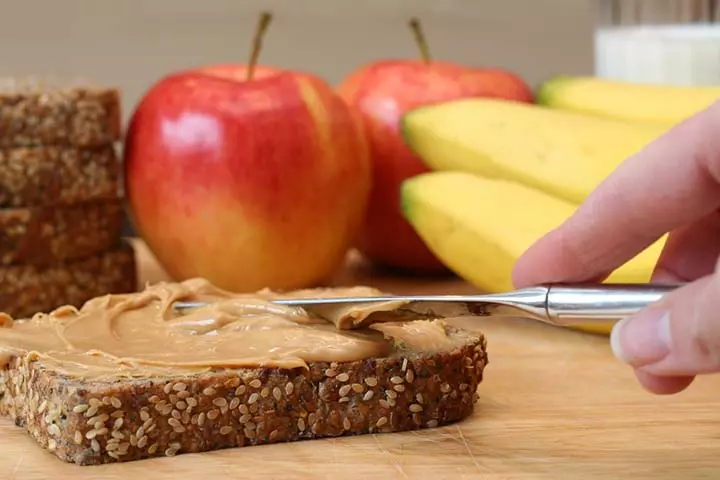
Image: Shutterstock
Peanuts also come packed with many other health benefits including:
- A rich source of minerals including niacin.
- They are a good source of energy.
- Healthy source of protein and unsaturated fats.
- Packed with fiber that improves digestive and heart health.
- Balances blood sugar levels.
- Contains vitamin E to maintain cell health and boost immunity.
- Low in cholesterol.
- Rich source of folate which helps prevent developmental disorders in children.
Risks of Consumption of Peanuts During Breastfeeding

Image: Shutterstock
While peanuts do come with many health benefits to offer, they may turn out to be risky if consumed while breastfeeding, particularly among mothers who suffer from nut allergies. Peanuts contain a particular protein that is capable of getting transmitted through breast milk- if your baby is allergic to peanuts, he may be severely affected.
Just a small amount of peanut in the diet could adversely affect your baby, and he may develop allergic reactions which could turn out to be potentially deadly.
In contrast, a study published in ‘The Journal of Allergy and Clinical Immunology’ in 2018 revealed how the consumption of peanuts while breastfeeding (among women who do not have a family history of the allergy) could actually reduce the risk of peanut allergies in children (2).
Is it Safe to Consume Peanuts While Breastfeeding?
It is best to avoid consuming peanuts or any products containing traces of this nut if you or someone from your family is affected by nut allergies.
- According to a few studies, women with no history of allergies may not need to avoid peanuts during pregnancy and breastfeeding to prevent allergy prevention. However, more research is needed to support this theory at this time (3).

Image: Shutterstock
- However, a study published in the Journal of the American Medical Association also states that when consumed peanuts by lactating mothers, infants may be at risk of sensitization reactions (4).
- A collaborative study involving multiple institutions revealed that 40.1% (205 out of 511) of babies aged three to 15 months had a peanut allergy. The study states that peanut allergy development is associated with younger age, higher IgE levels, and a lack of breastfeeding.
 Quick fact
Quick fact- Nevertheless, if you do consume these nuts during breastfeeding, check if your baby seems to be cranky or develops certain symptoms such as rashes or itchiness of the skin or diarrhea, hypersensitivity, and nasal congestion. If he does, rush him to the doctor immediately and make sure you do not consume peanuts for as long as you are breastfeeding.
Frequently Asked Questions
1. Does eating peanuts increase milk supply in a breastfeeding mother?
A breastfeeding mother does not need to eat a specific food to increase her milk supply. Her body produces milk based on the amount removed from the breast. So, if she is feeding her baby according to their requirement, her body will produce enough milk unless there is a physical or physiological issue (5).
However, it is essential to nourish your body properly while breastfeeding. So eating a well-balanced diet that provides 450-500 extra calories daily is sufficient to stay energetic (6).
2. Does eating peanuts when breastfeeding cause gas in babies?
Most mothers eat different food without their babies being affected, while some find that their babies become gassy if they eat specific foods. So, if you notice that your baby is fussy, gassy, or colicky after eating peanuts, it is best to avoid it in your diet for a period (7).
3. How long do peanuts stay in breastmilk?
Peanut protein gets transferred to the breast milk within ten minutes of consumption of one ounce of peanuts. This amount peaks after one hour and can be detected over 24 hours (8).
4. What should I do if I suspect my baby has a peanut allergy?
If you suspect your baby has a peanut allergy, stop giving them peanuts and consult your pediatrician promptly. They may recommend testing and offer advice on the next steps to ensure your baby’s safety.
Given the mixed suggestions and opinions surrounding the consumption of peanuts while breastfeeding, it is advisable not to consume them without your doctor’s consent. Although peanuts are a good option for healthy snacks, they may induce adverse reactions. On the other hand, it is also likely that early exposure to common allergens such as peanuts while breastfeeding can prevent future allergies. Nevertheless, the safest option would be to consult a doctor and monitor your baby for any unusual behavior post peanut consumption.
Infographic: Advantages Of Peanuts During Breastfeeding
Peanuts can be a great source of nutrients for you and your baby. Additionally, you may enjoy peanuts in various forms, such as boiled, roasted, ground, or peanut butter. Go through the infographic below that summarizes the nutritional benefits of peanuts. Keep it handy or share it with other nursing mothers.

Illustration: Momjunction Design Team
Worried about peanut allergies? Here are some surprising and interesting facts about peanut allergies in this informative video.
Illustration: Is It Safe To Eat Peanuts When Breastfeeding?

Image: Dall·E/MomJunction Design Team
References
- Peanut butter.
https://fdc.nal.usda.gov/fdc-app.html#/food-details/1100559/nutrients - Tracy J. Pitt et al. (2018); Reduced risk of peanut sensitization following exposure through breast-feeding and early peanut introduction.
https://www.jacionline.org/article/S0091-6749(17)31104-1/fulltext - Elissa M. Abrams and Scott H. Sicherer; (2018); Maternal peanut consumption and risk of peanut allergy in childhood
https://www.ncbi.nlm.nih.gov/pmc/articles/PMC6041250/#b2-190e814 - Peter Vadas at al. (2001); Detection of Peanut Allergens in Breast Milk of Lactating Women
https://jamanetwork.com/journals/jama/fullarticle/193696 - Breastfeeding and a Mother’s Diet: Myths and Facts.
https://laleche.org.uk/breastfeeding-and-a-mothers-diet-myths-and-facts/ - Breastfeeding FAQs: Your Eating and Drinking Habits.
https://kidshealth.org/en/parents/breastfeed-eating.html - Foods – for Nursing Parents.
https://llli.org/breastfeeding-info/foods/ - Peanut Allergy.
https://www.llli.org/peanut-allergy-2/#:~:text=Peanut%20transfer%20to%20breast%20milk&text=The%20amount%20in%20breast%20milkover%20a%2024%20hour%20period - Could There Be a Cure for Peanut Allergies in Children?
https://health.clevelandclinic.org/can-peanut-allergy-be-cured-in-children
Community Experiences
Join the conversation and become a part of our nurturing community! Share your stories, experiences, and insights to connect with fellow parents.
Read full bio of Reda Elmardi
Read full bio of Jessica Albert
Read full bio of Rohit Garoo
Read full bio of Shinta Liz Sunny










